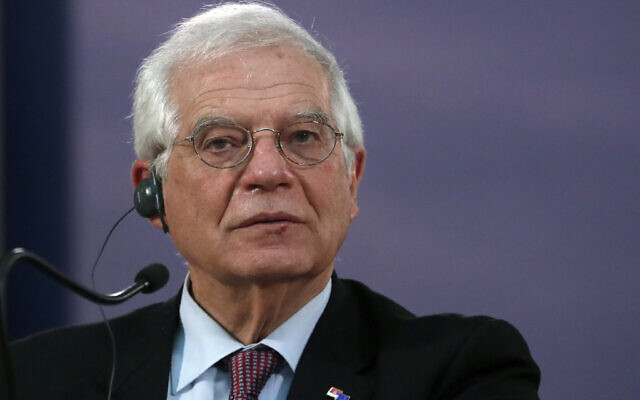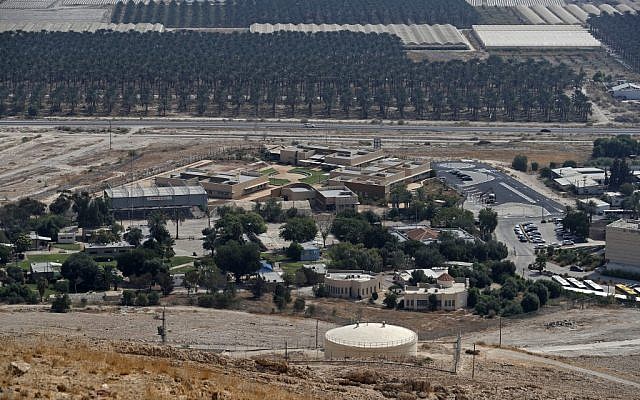Top diplomats to convene Friday, with Jerusalem’s plan to apply sovereignty to settlements, Jordan Valley ‘the most important item on the agenda’

European Union foreign ministers were set to meet Friday to consider potential measures against Israel over its plan to annex parts of the West Bank.
The ministers were expected to meet virtually due to the ongoing coronavirus crisis.
Several European nations led by France, and including Ireland, Sweden, Belgium, Spain and Luxembourg, have reportedly expressed support for threats of punitive action in a bid to deter the new Israeli government — set to be sworn in on Sunday — from carrying out the move with a green light from Washington.
On Tuesday EU foreign policy chief Josep Borrell said annexation plans and the union’s response to them would be “the most important item on the agenda” of Friday’s meeting.
The EU bloc is Israel’s largest trading partner, grants Israel favored trading status, and helps fund Israeli scientific research and development through its massive Horizon 2020 program.

Proposed steps include announcing that Israel would be prevented from entering into trade agreements with the bloc, receiving EU grants or participating in other forms of cooperation with the union.
It is not clear if the steps would apply to future agreements or freeze existing ones.
As part of their coalition agreement, Prime Minister Benjamin Netanyahu and Blue and White party chief Benny Gantz agreed that the government can begin moving forward with applying Israeli sovereignty to settlements and the Jordan Valley after July 1, a move expected to enjoy backing from a majority of lawmakers in the Knesset.
Though Gantz is believed to oppose unilateral action, he acquiesced to Netanyahu’s demand to allow the matter to be brought to a vote in parliament.
Borrell said that once the new government was sworn in he would speak with the new foreign minister, Gantz ally Gabi Ashkenazi, to receive information on the Israeli plans moving forward.
“There is clearly a need to look at what annexation means in the context of international law and we do need to know our options,” a senior EU diplomat told Reuters earlier this week. “We also need to say what exactly the consequences of annexation would be, ideally as a way to stop any such move.”
On Monday, European External Action Service spokesman Peter Stano said any EU decision on future sanctions would depend on the results of Friday’s deliberations.

“Annexation is contrary to international law and if annexation goes ahead, the EU will act accordingly,” he said, according to Reuters.
In February, Borrell said annexation “could not pass unchallenged.”
The foreign ministers are unlikely to issue any decision on Friday. The Commission and the External Action Service, the EU’s executive and foreign service branches, have yet to propose specific options for member states to consider.
Also key to the discussions will be finding potential punitive measures that would not require the unanimous agreement of all 27 bloc members, as Israel’s allies, including Hungary and the Czech Republic, would likely veto any proposals that require unanimity.
“No one wants to reach the point that Israel’s relations with the union are harmed for the long term, but that’s what will happen if Israel annexes, if only because of the precedent an annexation would set for every other place” where nations are fighting over disputed land, an EU source was quoted by Haaretz as saying.
Annexation of settlements and the Jordan Valley has been a key campaign promise of Netanyahu and his Likud party in recent elections. A plurality of slightly fewer than half of Israelis back the idea, and fewer than a third think the government will actually go through with it, according to a survey of Israelis released Sunday.

Netanyahu’s plan to annex portions of the West Bank has been met with harsh criticism from nearly the entire international community, including Washington’s European allies and key Arab partners. President Donald Trump’s Mideast peace plan allows for the possibility of US recognition of such annexations provided Israel agrees to negotiate under the framework of the proposal that was unveiled in January.
According to the proposed plan, the US will recognize an Israeli application of sovereignty over parts of the West Bank following the completion of a survey conducted by a joint US-Israel mapping committee and Israel’s acceptance of both a four-year freeze of the areas earmarked for a future Palestinian state and a commitment to negotiate with the Palestinians based on the terms of Trump’s peace deal.
Alone among most governments, the Trump administration has said it will support the annexation of West Bank territory claimed by the Palestinians for an eventual state as long as Israel agrees to enter peace talks.
US Ambassador David Friedman said last week that Washington is ready to recognize Israeli sovereignty over parts of the West Bank should it be declared in the coming weeks.
As reported by The Times of Israel
